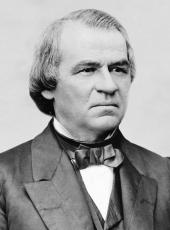To the Senate of the United States:
The resolution adopted on the 5th instant, requesting the President "to transmit to the Senate a copy of any proclamation of amnesty made by him since the last adjournment of Congress, and also to communicate to the Senate by what authority of law the same was made," has been received.
I accordingly transmit herewith a copy of a proclamation dated the 25th day of December last. The authority of law by which it was made is set forth in the proclamation itself, which expressly affirms that it was issued "by virtue of the power and authority in me vested by the Constitution, and in the name of the sovereign people of the United States," and proclaims and declares "unconditionally and without reservation, to all and to every person who, directly or indirectly, participated in the late insurrection or rebellion, a full pardon and amnesty for the offense of treason against the United States, or of adhering to their enemies during the late civil war, with restoration of all rights, privileges, and immunities under the Constitution and the laws which have been made in pursuance thereof."
The Federal Constitution is understood to be and is regarded by the Executive as the supreme law of the land. The second section of article second of that instrument provides that the President "shall have power to grant reprieves and pardons for offenses against the United States, except in cases of impeachment." The proclamation of the 25th ultimo is in strict accordance with the judicial expositions of the authority thus conferred upon the Executive. and, as will be seen by reference to the accompanying papers; is in conformity with the precedent established by Washington in 1795, and followed by President Adams in 1800, Madison in 1815, and Lincoln in 1863, and by the present Executive in 1865, 1867, and 1868.
ANDREW JOHNSON.
Andrew Johnson, Special Message Online by Gerhard Peters and John T. Woolley, The American Presidency Project https://www.presidency.ucsb.edu/node/203200

